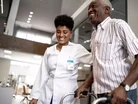Virtual infection control training for care homes launches

Critical workers in healthcare environments in the UK can now gain essential emergency infection control and prevention skills virtually, thanks to training technology being developed by Solutions 42, with support from vocational education specialist Ufi VocTech Trust.
Solutions 42 is a performance improvement advisory that has developed an e-platform called 'Spotless'. The scenario-based platform provides staff with the principles of Infection Prevention and Control (IPC) in healthcare environments.
The app-based software allows care home emergency procedures to be taught remotely, but also practised virtually. Learners are put in realistic scenarios where they make decisions on how to manage the hygienic care of residents and their surrounding environment.
Back in March, UK care homes - which house about 400,000 elderly people - shut their doors as the coronavirus pandemic surged. Six months later, the government is weighing up banning staff from working in more than one care home to cut transmission, against the risk this poses to staff shortages.
Solutions 42 and Ufi have developed the platform as a solution to this, swo that new staff members can be trained in infection control without taking physical resources away from care homes.
Becky Hill, Founder of Solutions 42, says: “Thanks to funding from the Ufi VocTech Trust, we’ve been able to implement a platform that has the potential to save lives. Digital, scenario-based teaching will revolutionise the way that staff are being trained in infection control.
"It empowers those on the front lines of care home hygiene to gain the skills and confidence needed to manage high-risk scenarios, before actually entering those environments."
Spotless is funded and technically facilitated by Ufi. Rebecca Garrod-Waters, CEO at Ufi VocTech Trust says: “Face-to-face training is become a less and less viable option in healthcare environments, even though it has never mattered more. The need for limited face-to-face contact shouldn’t have an impact on someone’s ability to develop skills which mean that they can provide essential, effective care and progress in their career.
“Through the introduction of remote learning technology, we can give community workers the opportunity to practise first-response action before being faced with a high-risk situation, keeping themselves and patients safer.
“‘Spotless’ is a perfect example of how advocating for the delivery of accessible and truly applicable vocational education technology helps us not just to respond to a crisis, but allows us to construct a sustainable training system which has long-lasting benefit.”



